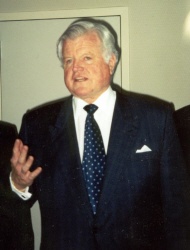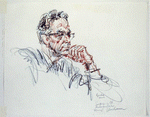Posted on May 18, 2005
The Disappear-Ring
How "privacy" protects the Left
by
Daniel Clark
Legend has it that a shepherd named Gyges came into possession of a magical ring which, when he turned the stone toward the inside of his hand, made him invisible. Gyges used this power to murder King Candaules of Lydia and assume the throne for himself. In Plato's Republic, Glaucon uses this story to argue that any man, however outwardly virtuous, would be willing to steal and even kill, if only he had the power of the Ring of Gyges to prevent himself from being caught.
Today, Glaucon's theory is being put to the test, except that the magical ring in this case is that halo of liberal self-righteousness known as "privacy." All that's needed is for a liberal, or else someone whose personal interests coincide with liberalism, to make a claim of privacy, and his wrongdoings will be made to disappear.

Imagine, for example, that the manager of a radio station engages in lewd acts with a young intern in the workplace, and then gives her a somewhat lucrative full-time job, for which she is entirely unqualified. If this arrangement was ever discovered, that manager would be in a world of trouble, because he's not protected by the ring.
However, when a liberal President of the United States behaved the same way with a White House intern, rewarded her by having his friend find her a paying job, and repeatedly lied about it under oath, it was a different story. Front-page news accounts regularly complained that the special prosecutor was snooping into President Clinton's "private life." Pollsters tracked two separate presidential approval ratings: one on his "private life," and the other on his "job." By default, the job approval rating excluded from consideration any of the president's scandals, which had already been established as "private." Never mind that some of them involved his literal abuse of his office.
Because Clinton had these "private" encounters in the West Wing of the White House, Linda Tripp, who worked in the White House Counsel's Office, couldn't help but witness one of them. Through no fault of her own, Tripp was called to testify about Clinton's alleged harassment of White House volunteer Kathleen Willey. The aforementioned intern, Monica Lewinsky, gave Tripp the infamous "talking points memo," pressuring her to change her testimony. Tripp had no intention of perjuring herself as instructed, but she needed to protect herself from retribution. So she taped some phone conversations she had with Lewinsky, in which Lewinsky recounted her sordid relations with "The Big Creep."
Upon learning of the scandal, the media were outraged -- at Tripp. You see, Tripp was guilty of violating the privacy of her extortionists. If she had joined Clinton and Lewinsky in conspiring to subvert justice, she'd have been given the ring, and allowed to disappear into anonymity. Since she resisted, however, she wasn't permitted a second of privacy for months. By the time the news and pop media were finished working her over, she was almost universally seen as evil incarnate. Even her appearance and her weight became objects not only of ridicule, but of moral condemnation.
The ring of privacy was employed more recently by the Democrats on the Senate Judiciary Committee in early 2004, to make a series of potentially damning memos vanish from public view. One of those memos, written to Sen. Ted Kennedy, instructed committee Democrats to stall the confirmation hearing for a Sixth Circuit Court appointee, until after that court had ruled on the University of Michigan's affirmative action policies. Moreover, it identified the NAACP Legal Defense Fund -- which had filed a brief in that appeal -- as the source of the request, because that organization feared that a new Bush appointee on the court might swing the decision against its interests.

The gross ethical impropriety of this arrangement never made it to the headlines, because as far as the Democrats and therefore the press were concerned, the real scandal was the manner in which the memos had been obtained. Democrats complained that a Republican staffer had hacked into their database. Sen. Kennedy called it a "theft" reminiscent of Watergate. He and three other Democrat senators sent a typewritten tantrum to then-White House Counsel Alberto Gonzalez, redundantly demanding to know if his office was involved in the "secret surveillance" that produced the documents, and accusing President Bush of having "greatly contributed to the atmosphere in which Republican staff committed these acts."
It turned out that no hacking had been necessary, because the Democrats had left the memos on a shared server that was accessible to Judiciary Committee members of both parties. "These documents are not confidential under Senate rules," explained Manuel Miranda, the staffer who made them public. "They're not protected in any way." Miranda was nevertheless forced to resign his position as advisor to Senate Majority Leader Bill Frist, because the quivering Jellyphants of his party were unwilling to fight back against their opponents' false but intense charges.

It didn't matter that Miranda broke no laws or Senate rules; the important thing is that a group of liberals felt that he'd violated their privacy. That's why the content of the memos was never an issue. Once the judicial tampering by committee Democrats and the NAACP was framed as a matter of privacy, it vanished from sight. News reports about Miranda's "theft" did not even see fit to explain what it was that he'd "stolen."
Like Gyges, one who is armed with the ring can even get away with murder. When Michael Schiavo had his disabled wife Terri starved and dehydrated to death, he did it with the full complicity of the major news media. While excusing Michael's actions as a matter of privacy on the one hand, the media publicly demanded Terri's death on the other. News reports routinely misidentified Terri as being "brain dead," while editorials stated with certainty that there was "nobody in there." An ABC News poll showing that most people thought Terri should die said she'd "been on life support for 15 years," when in reality the only support she'd needed was somebody to feed her. Predictably, the fact that the premise of the question was misleading did not cause ABC to reconsider the results.
The Los Angeles Times justified the manner of Terri's death by explaining that she would feel a "characteristic sense of euphoria that accompanies a complete lack of food and water." Once the media find somebody they want to be killed by starvation and thirst, it is no longer a painful experience. Instead, it's merely a cheap high, kind of like sniffing glue.
When Congress voted to give federal courts jurisdiction over the case, the media discovered one of the few things they think is none of the federal government's business. Editorials fumed about the supposed violation of constitutional separation of powers, without pointing out any part of the Constitution that was being violated. One harangue by Slate editor Dahlia Lithwick complained that, "The rule of law in this country holds that this is a federalist system -- in which private domestic matters are litigated in state, not federal courts." And just how do you know when a killing in the family is a "private domestic matter"? Keepers of the ring like Ms. Lithwick will tell you.

It's hardly a new concept that killing a close family member would be framed as a privacy issue. In Roe v. Wade, the Supreme Court legalized abortion nationwide based on a fictitious constitutional "right to privacy." Justice Harry Blackmun, who wrote the majority opinion, determined that, "We need not resolve the difficult question of when life begins." So the Court conceded that a fetus might be a person, but decided that it can legally be killed anyway, because its killing would be "private."
Every January, the news media mark the anniversary of Roe v. Wade, but never do they delve into Blackmun's opinion to reveal its incoherence. This makes it all that much easier to tell us how popular that decision is among the American people, most of whom know practically nothing about it. Another deceitful ABC poll conducted in 2004 found that 59 percent of Americans wanted the Roe ruling upheld, but only after misinforming respondents that it only legalized abortions in the first trimester. So in order to drum up positive poll numbers, Roe was made to sound far more restrictive than it actually is. But then, what does ABC care about informing its viewers about the case? Being a matter of "privacy," it's none of their business anyway.

Would these issues remain private if they became more politically incorrect? For example, some people think homosexuality is a genetic trait. What if a homosexual gene is identified, so that people can discover the sexual orientations of their unborn children? Would abortions specifically targeted at gay and lesbian children still be private? And what if the Schiavos had been an interracial couple, with Terri belonging to a racial minority? What if she'd also been a Muslim instead of a Catholic? Would her killing have still been a "private domestic matter," or would it have become a "hate crime?" There's no way of knowing the answers to these questions, but the liberal conundra they pose demonstrate that there does come a point at which the ring of privacy is revoked.
As far as liberals are concerned, you only have the right to privately do the things that they want you to do. Schoolchildren can privately obtain contraceptives at school without their parents' knowledge, but if they try to privately say grace in the cafeteria, it can literally be made into a federal case. Most private clubs are free to quietly abide by their own membership rules, but when a handful of feminists criticized the all-male Augusta National Golf Club, the New York Times launched a quixotic campaign to change the club's policy.
Since most people don't live their lives as liberals, this liberal notion of "privacy" applies to them less and less all the time. People are often prevented from developing their own land, because some endangered insect might inhabit it, or because practically any damp spot on the ground can be characterized as a federally protected wetland. Although tobacco remains a legal substance, people may soon lose the freedom to smoke it even in their own homes, due to lawsuits over second-hand smoke wafting across property lines. Even people's eating and drinking habits are becoming a matter of public concern, under the new socialistic rubric of "wellness."
The city of San Francisco has passed an ordinance dictating how people must care for their dogs, including requirements that they keep their water bowls out of the sun, and give them "full access to an enclosed building at all times." It also requires that all dog food be "palatable and nutritious." Exactly how compliance is monitored remains unclear. San Francisco law eschews the demeaning term "dog owner" in favor of "pet guardian." Mind you, if a pet guardian were anything like a person's guardian, he would have the right to starve his dog into euphoria.
The disturbing trend outlined here is that acts which directly inflict harm on innocent people are protected by "privacy," while benign activities are subject to intrusion and punishment. But then, this is only consistent with Glaucon's argument. After all, Gyges would not have bothered making himself invisible just to shear a sheep or two. Nor do liberals typically go around demanding "privacy" for the protection of the innocent.
The Shinbone: The Frontier of the Free Press
Mailbag . Issue Index . Politimals